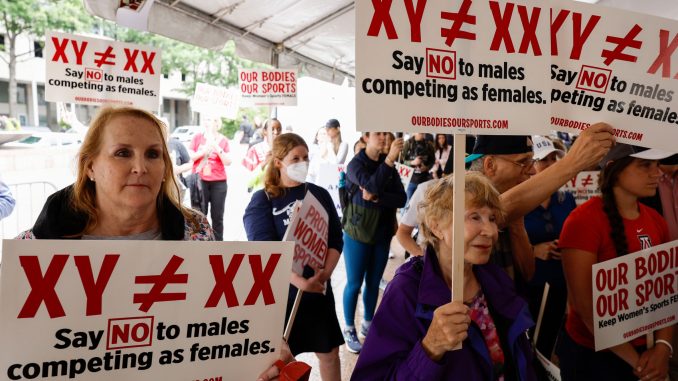
Title IX of the Education Amendments of 1972—a law guaranteeing equality between the sexes in education—has been on the chopping block from Day One of the Biden administration.
But after a lengthy delay, the federal Department of Education has formally announced it will punt on the announcement of its new Title IX sports rule, one that would permit biological males who identify as females to participate in women’s scholastic sports in accordance with their gender identity.
The civil rights law has been subject to rulemaking, both on the trans-sports issue and on the broader application of gender-identity protections in federally funded education programs.
While the administration has announced that it will delay announcing its new sports rule, at least for now, the broader, earlier proposed Title IX rule is already in the final stages of review at the White House, with a likely release date in August or September. Once released, it would apply to private spaces (restrooms, locker rooms, dorm rooms), preferred pronouns, sexual assault and harassment, and more.
The seismic changes included in the rule will affect any educational program that is funded directly or indirectly by the federal Department of Education—whether public school, private school, higher education institution, recreation center, charter school, or the like.
In reporting on the delay of the sports rule, The Washington Post quoted an insider who said, “Folks close to Biden have made the political decision to not move on the athletics [regulation] preelection. It seems to be too much of a hot topic.”
It sounds like the White House is finally waking up to the radioactivity of the trans-sports issue, a notion borne out by recent polling that indicates nearly 70% of Americans support separating sports by biological sex.
That polling, and the delay of Biden’s sports rule, means that now more than ever, state legislatures must act in the interest of female athletes and pass legislation protecting women’s equal educational opportunity before it’s too late.
That’s due to two developments; namely, the temporary suspension of the Title IX sports rule and the fact that even though the administration cleaved out a Title IX sports rule from the broader Title IX rule, a closer reading of the fine print indicates that, despite the administration’s attempts at legerdemain designed to fool the public, sports are included in the broader, earlier rule after all.
The earlier proposed Title IX rule explains, “preventing any person from participating in an education program or activity consistent with their gender identity would subject them to more than de minimis harm on the basis of sex and therefore be prohibited.” School sports? They’re “an education program or activity.” The proposed rule also prohibits gender identity discrimination in “extracurricular activities.”
Extracurricular activities include school sports.
There are 25 states with women’s sports laws on the books. And while Wisconsin’s governor, Democrat Tony Evers, just vetoed a state bill that would have maintained sex separations in school athletics, other states—Nebraska, for instance—still have time to act before the close of their legislative sessions.
Nebraska’s “Sports and Spaces” Act, LB 575, is sponsored by state Sen. Kathleen Kauth of Omaha, who is hopeful the bill will be voted out of committee sometime within the week. The bill would restrict access to school bathrooms and locker rooms based on biological sex and would add similar restrictions to most school sports teams.
Some have dubbed it one of the “most controversial bills” of the legislative session, likely due to the hot-button nature of its subject matter. As a result, the bill has been sitting in committee since its introduction by Kauth last year.
But controversial, it isn’t—or at least shouldn’t be. With 70% of Americans backing these kinds of commonsense restrictions, it’s a wonder the legislation has stalled, especially in light of increasing evidence that women aren’t just losing playing time and athletic titles to transgender-identified men, but are now increasingly injured as a result of competing against them.
Nebraska’s legislative session ends on April 18. But all pending legislation must be debated on the floor before the end of this week to advance.
The speaker of the Nebraska Legislature, John Arch, has urged senators to consider the truncated time frame of legislative debate and hold off on bills that are unlikely to have enough votes to progress.
Such timidity is misguided.
Fifty years ago, the feminists of yore worked tirelessly to secure equal educational opportunity for women and girls. But choosing to support self-proclaimed “females” over biological girls who simply want a chance to play is wrong.
The time for legislative action is now—before it’s too late.

